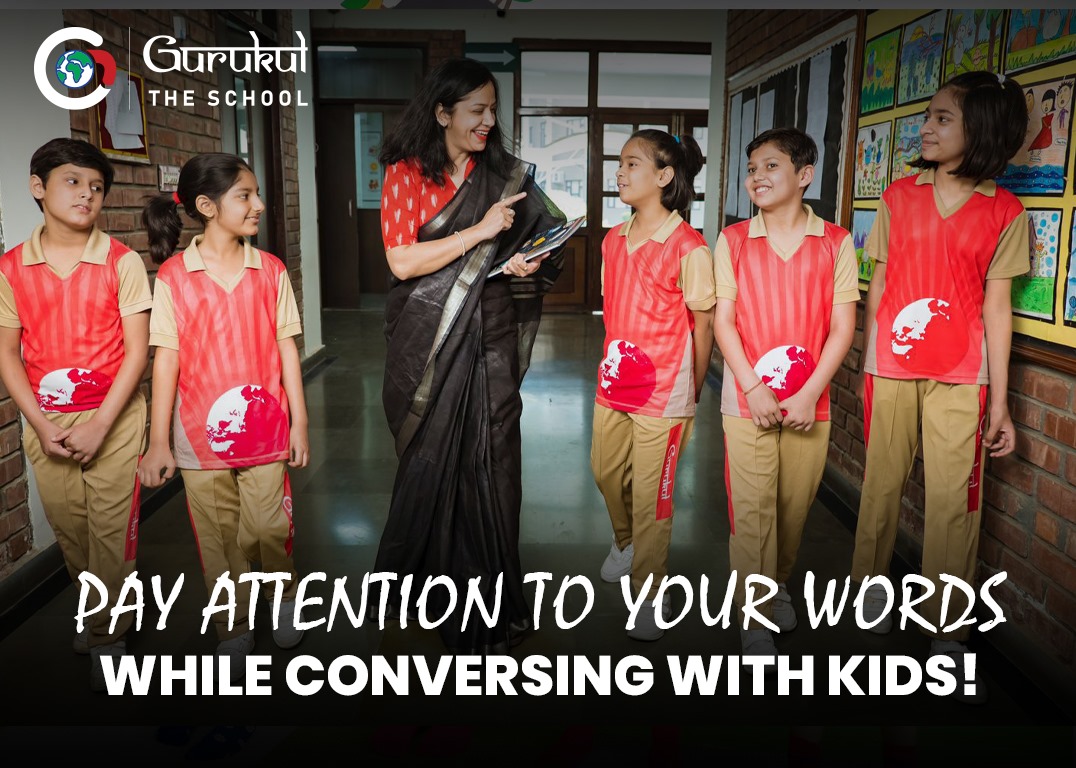Pay Attention to Your Words While Conversing with Kids!
posted on May 15, 2024
Gurukul The School, ranked among the best school in ghaziabad, firmly believe that words aren’t merely communication tools but a powerful element that can shape children’s overall well-being and development. This is why we always tell parents

“Words can inspire. And words can destroy. Choose yours well.” – Robin Sharma
The quote beautifully describes the power of words. While most of us know that words hold immense power, only a few pay attention to the words they choose while conversing with others. This especially holds true in the case of parent-child conversations. The words parents use to converse with their children are more powerful than anyone could realize.
We at Gurukul The School, ranked among the best school in ghaziabad, firmly believe that words aren’t merely communication tools but a powerful element that can shape children’s overall well-being and development. This is why we always tell parents to be conscious and thoughtful with their word selection because these building blocks can construct their child’s self-perception, worldview, emotional intelligence, and cognitive abilities.
Something as seemingly harmless as ‘It’s just a silly drawing’ or ‘Leave it, you won’t understand’ can deeply affect the child’s psyche, creating a dent in their self-esteem and self-worth. On the other hand, using a positive communication approach with encouraging words like ‘I’m so proud of your efforts’ can subconsciously nurture their confidence and resilience. We believe words don’t just help communicate but mold the very essence of how children view themselves and their place in the world.
If you’re still unsure of how words impact children’s overall well-being and why parents must be thoughtful in their choice of words, read the points shared below.
- Shaping children’s self-perception
How parents speak to their kids directly influences their self-image, confidence, and self-esteem. If you constantly use encouraging and positive words in your daily communication, you instill a healthy sense of self-worth in children. Even if you find yourself in a pressing situation, sticking to words that celebrate their efforts, acknowledge their feelings, and validate their emotions can empower them to believe in themselves and their abilities.
On the other hand, parents who often use negative words to criticize, belittle, or dismiss their children’s emotions raise kids with a lower sense of self-worth. These words may make kids feel insecure about themselves from a young age, shaping limiting beliefs about their capability and true worth.
- Supporting emotional development
Few realize that words are powerful and can shape a child’s emotional intelligence. We at Gurukul The School have seen that when parents use positive and encouraging words in their daily conversations, they teach kids how to recognize and process their emotions in a healthy way. They also learn how to regulate emotions correctly instead of turning to unhealthy coping mechanisms. But if parents begin using harsh words for even the smallest mistakes, their words can trigger anxiety, emotional distress, and even depression in young kids.
Prolonged exposure to overly-critical words may compel kids to suppress their emotions. It will show later in life as their inability to express themselves effectively, creating long-term emotional challenges. Parents can prevent such consequences by being more conscious about their choice of words. Displaying more empathy in all parent-child communication can support healthy emotional development in all kids.
- Developing an unbiased worldview
The language parents use while communicating with their kids can shape their understanding of the world, beliefs, and values. It can either promote a positive and inclusive worldview or inadvertently reinforce negative stereotypes and societal biases.
At our school, we encourage an increased usage of inclusive and respectful language so kids learn to embrace diversity and appreciate the richness of different cultures, perspectives, and experiences. We would like to urge the parents to try and understand the very fact that their choice of words can influence their kids’ sense of justice, fairness, and social responsibility. The best way to raise responsible and mature kids with a clear understanding of the world around them is by modeling a language that promotes empathy, kindness, and respect for others. Your choice of words will, directly or indirectly, influence their social interactions and relationship quality throughout their life. So, make it a habit to use positive words in daily communications.
- Impacting the overall cognitive development
A lesser-discussed aspect of a parent’s word selection in daily interactions is its impact on the child’s overall cognitive development. It can influence all their cognitive abilities, like problem-solving, creativity, critical thinking, etc. When parents use plenty of rich and diverse vocabulary in their regular communications, they expose kids to a broader range of words, concepts, ideas, etc., fostering their linguistic skills and expanding their cognitive horizons.
Parents can also initiate thoughtful conversations with their kids and use language that sparks their curiosity and exploration. It can significantly stimulate the child’s cognitive development. Even if parents have a busy schedule, a small, meaningful conversation can challenge them to seek a deeper understanding, think critically, and ask questions. Avoid using repetitive and overly simplistic language on loop because it will inadvertently limit their intellectual growth.
Conclusion
We at Gurukul The School, one of the best schools in Ghaziabad, firmly believe that words are beyond mere utterances; they’re potent tools that can shape a child’s view of themselves, their beliefs, values, and more. They’re also the very essence of a parent-child relationship because it facilitates the exchange of feelings, ideas, and emotions. Hence, all parents must remain conscious of their language and use words that nurture, empower, and uplift their kids. Prioritizing positive, respectful, and inclusive language can create a nurturing environment that propels growth, self-confidence, and emotional resilience, helping kids grow in a healthy manner.